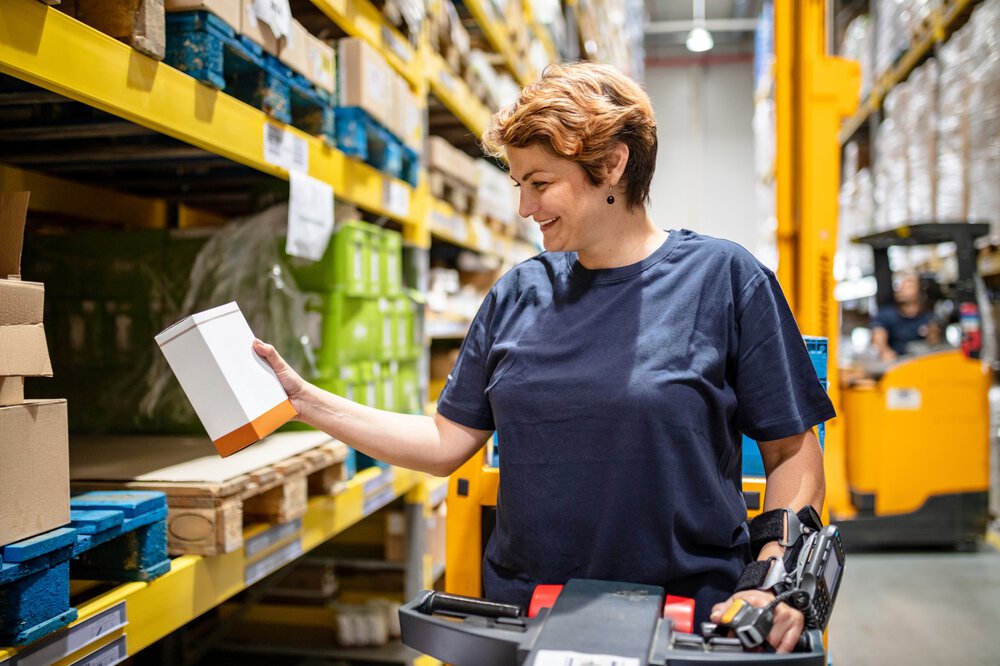Developments & Logistics Concepts of the Future: These Are the Current Trends in Logistics
Climate change, Brexit, driver shortage: to be able to continue their operations in the long run, carriers have to rely on new solutions to the current challenges of the logistics industry. We will show you the latest approaches and trends in logistics and tell you which innovative ways are driving the logistics industry.
30 tank containers with hazardous goods to Sidney or a parcel with urgently needed spare parts for a machine in the Swabian Mountains: The tasks handled by carriers are varied and do not only require a high degree of flexibility, but—apart from a broad network of partners—knowledge of the industry, in order to be able to meet the current challenges adequately. Find out here which logistics concepts will define the future, and which developments and trends are driving the industry.
1. Artificial Intelligence & Autonomous Logistics
Artificial intelligences have long harbored decisive potentials for the logistics industry, because carriers can use them to design more efficient processes, facilitate data collection and prevent downtime.
- Thus, the latest warehouse robots are already so sensitive that they can be used at the logistics center right next to human workers, without jeopardizing their safety. For loading and unloading delivery trucks, robots might also become decisive factors in the supply chain of the future.
- Self-driving delivery vehicles can drive for 24 hours even in poor weather conditions, without having to observe resting times for the drivers—and on top of that they could save fuel with their automatic driving mode.
- Self-driving fork-lift trucks could also do heavy-duty work within the warehouses.
But as yet this technology is not sufficiently mature—just like the legal framework for self-driving cars.
The following presentations at transport logistic 2019 discussed the relevance of artificial intelligence to the future of logictics:
Artificial intelligence in transport logistics
Artificial Intelligence: Next Level Air Cargo?
Artificial intelligence—logistics is becoming smarter and more autonomous
Artificial Intelligence at Air Cargo | transport logistic

2. Logistics 4.0: Using Innovative Technologies for the Supply Chains
In the Internet of things any object can be connected with any other object through the network, can pass on data about its condition and thereby trigger a reaction in another device. This also opens up undreamt-of possibilities in logistics:
- In networked warehouses all objects convey information on their current condition and location.
- Intelligent delivery solutions collect highly accurate information on the delivery status of a parcel.
- Smart refrigerators can place orders for consumers in eCommerce.
In some of the presentations at transport logistic innovative technologies were the main topic:
- The contribution of AutoID technologies to the digitalization of (transport) logistics processes
- Blockchains—enabler for the logistics of the future
- Cyber security threats and defense strategies in the transport and logistics industry
3. Digital Networking of the Supply Chain
In the chemical and pharmaceutical industry, in automotive engnineering or entertainment electronics: carriers are increasingly becoming strategic partners and have to ensure ever more extensive networking and deeper integration in the supply chain of customers. This is a step which results in decisive cost benefits for forwarders.
Carriers who take this up and establish high-performance information technology and functioning interfaces to connect to the inventory control systems of their customers, will benefit through long-term business perspectives.
Attend the following presentations to find out more about networking possibilities in the supply chain:
- Cooperation in logistics and SCM: Examples, technologies, potentials
- Supply chain management: Digitalization and sustainability in the supply chain
- Pharma supply chain—quality comes at a cost!
4. Multichannel Logistics
The traffic infrastructure causes a lot of headache in the logistics industry: all industries have to rely on a dependable road network, but this is where Germany has not been pursuing a forward-looking traffic policy for decades. Road works and traffic jams are the consequence, which affects not only the big industries, like the construction and automotive sectors, but also the consumer goods industry with its numerous manufacturers of textiles, furniture and food.
When it comes to getting on top of this problem, multichannel logistics is the crucial cue: with a broader position and greater diversification of the distribution logistics channels, the risks of delays can be reduced and logistics processes can made more stable.
In the following presentations of transport logistic, experts discussed multichannel logistics.
- Innovation instead of stagnation in Brenner transit—marketable practical solutions for combined transport
- Railways for the future! What can the Rail Freight Masterplan do?
- Structural change and digitalization in the container transport of European sea ports—effects on inland traffic and terminals
5. Structural Change of Global Logistics
Trade conflicts and economic protectionism can be decisive influences on the trade flow of the international supply chain. This affects all kinds of transport, trucks, ships and trains. To prevent this from happening, the political setting must be right. But what can be done for the global supply chain to continue to be functional in times of Brexit and Co.?
In view of the growing challenges and imponderabilities, all players of the logistics industry have to join forces to secure the future of logistics as a strategic success factor.
The following presentations of transport logistic discussed ways to achieve this:
- New era in the UK—transformation or termination?
- Is globalization over? Outlook on international trade
- The new Silk Road—where is the hype taking us?
